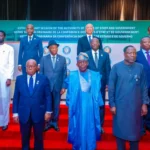The Authority of Heads of State and Government of the Economic Community of West Africa States (ECOWAS) will hold an Extraordinary Summit on the political situation in Mali today, Thursday.
The Directorate of Communications of the ECOWAS Commission disclosed this in a statement on Wednesday in Abuja.
- Mali coup leaders pledge new elections as president ‘resigns‘
- World bodies mount pressure on Mali junta to step down
The summit, which would hold virtually through video conference, was convened following the military coup d’etat that happened in the Republic of Mali on Tuesday.
Rebel soldiers took President Ibrahim Keita and Prime Minister Boubou Cisse into custody on Tuesday afternoon and drove the pair to a military base on the outskirts of Bamako, which they had seized that morning.
Keita later announced early Wednesday that he had resigned to avoid “bloodshed.”
Already, the Economic Community of West African States (ECOWAS), in a swift reaction to the coup, promised to close land and air borders to Mali and push for sanctions against “all the putschists and their partners and collaborators”.
The 15-nation bloc – which includes Mali – also suspended the country from its internal decision-making bodies.
ECOWAS last month suggested the formation of a unity government while offering continued support for Keita, but the compromise was rejected by the opposition.
The Federal Government, yesterday, condemned the coup by mutineers and called for the urgent activation of the ECOWAS Standby force.
It also demanded the immediate and unconditional restoration of constitutional order.
The Minister of Foreign Affairs, Geoffrey Onyeama, in a tweet, said: “The Nigerian Government unequivocally condemns the coup d’état that took place in Mali yesterday (Tuesday) and demands the immediate and unconditional restoration of constitutional order.
“We welcome the urgent activation of the ECOWAS Standby force.”
UN Secretary-General, Antonio Guterres, demanded the “immediate and unconditional release” of Keita and Cisse as diplomats in New York said the Security Council would hold emergency talks on Wednesday.
French President Emmanuel Macron condemned the mutiny, according to his office, and said he supported mediation efforts to resolve the crisis by other West African states.
A former speaker of ECOWAS Parliament, Senator Ike Ekweremadu, said the military intervention in Mali could contaminate other democracies in the sub-region if not resisted by the international community.
The Inter Party Advisory Council of Nigeria (IPAC) under Chief Peter Ameh, called for the intervention of world leaders to ensure a swift return to civil and democratic rule in Mali.
The council insisted that, no matter how interestingly coined, military coup should never be supported or encouraged by any responsible government, individual or group of individuals, most specifically in Africa, due to the attendant negative impact of such action on the civilian population.
The Convener, Good Governance Team (GGT), Mr Tunde Salman, said any military usurpation of democratic regime should not be acceptable within the West Africa sub-region.
Military forms committee for transitional power
The coup’s leaders have pledged a political transition and new elections within a “reasonable time”.
Colonel-Major Ismael Wague, deputy chief of staff of Mali’s air force, announced on national television the formation of the National Committee for the Salvation of the People (CNSP), which would lead the volatile West African nation until general elections were scheduled.
“We, the patriotic forces grouped together in the CNSP, have decided to take our responsibilities before the people and before history,” Wague told the nation.
The CNSP was aiming for “a civil political transition” and would hold general elections “within a reasonable timeframe,” he added.
A military coup had been necessary because Keita’s government had led Mali into “chaos, anarchy and insecurity,” Wague said.
Why I resigned – President Keita
The ousted president said yesterday that he had resigned to avoid “bloodshed”.
Keita appeared calm as he appeared in a state television broadcast soon after midnight to declare the dissolution of the government and national assembly, and said he had no choice but to resign with immediate effect.
“If it pleased certain elements of our military to decide this should end with their intervention, do I really have a choice?” he said of the day’s events.
“(I must) submit to it, because I don’t want any bloodshed.”
The coup coincided with opposition plans to resume protests against Keita.
A resistance group, M5, is insisting that the Constitutional Court must be dissolved, and the President resign, before peace can return to the country.

 Join Daily Trust WhatsApp Community For Quick Access To News and Happenings Around You.
Join Daily Trust WhatsApp Community For Quick Access To News and Happenings Around You.

